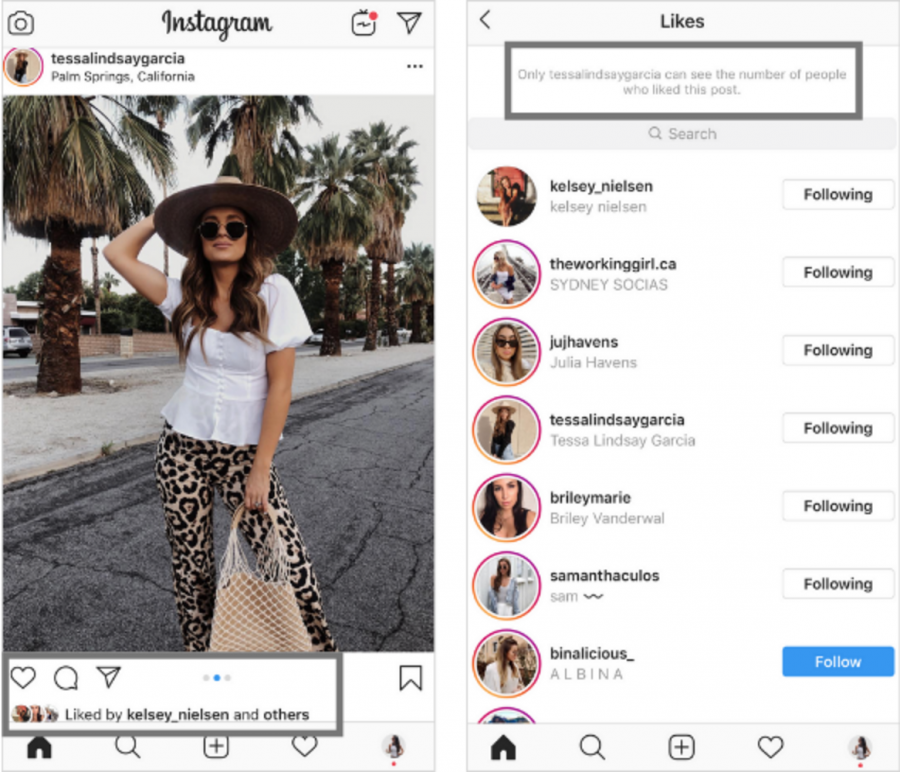What it Means for Instagram to Remove Their Likes
Many argue that Instagram is one of our generation’s most-used social media networks. The idea of Instagram is to provide a platform where anyone can share photos and videos freely, as long as they’re not offensive to the viewers. It is built around the publication of media, followed by a series of comments and likes. Recently, Instagram has made what many consider to be the app’s boldest move yet; it has completely removed the number of likes from appearing in people’s pictures. For the time being, this change has only been seen in seven countries, Brazil being one of them. This adjustment is only at its trial phase, but if it has a good reaction from users, it might become permanent. People have had a variety of opinions when it comes to the app’s decision to remove likes. Some say it’s a fundamental step in the process of removing the toxic environment in which we often find ourselves, and others argue that the removal of likes will have negative consequences for Instagram as a business.
When the platform announced this change, they claimed that people would feel less pressure to post only “perfect” content. They would be more confident in posting what they feel represents them, instead of what they know will get other people’s attention. In the post announcing this change, the caption read, “We want your followers to focus on what you share, not how many likes your post gets.”
It is not uncommon for users to put up a fake front for all their followers, posting only things that reflect their carefully-curated lifestyle, wealth, and beauty. This may cause viewers to think that the post is an authentic representation of what people look like, which brings up the whole issue of misrepresentation and problems with body image. This can have negative consequences, not only on viewers but also on the creator of the content. Many people have admitted that all the work that goes into a single photo can be completely draining. A famous example is Essena O’Neill, a former social media star who quit Instagram in 2015. She was an “influencer” like any other, but after years on the app, she spontaneously deleted over 2,000 photos, and dramatically edited her captions to reveal what was going on behind the scenes. She described her posts as “contrived perfection made to get attention”, and also disclosed how much work and editing went into each and every picture. What was all that for? The number of people usernames who liked the photo and the satisfaction of having people’s praises.
The hopes of this initiative are to remove pressure and build a less hyper-competitive community. For viewers, the benefits of this are strongly argued, but there are some aspects of this choice that can truly affect the so-called “influencers” of Instagram. One interesting argument is based on the fact that Instagram is a huge platform for marketing and advertising. Some users have brought up the claim that the removal of a quantitative measure of success for a post will forever change the way that the app is used in business. This is because it’s very common for people to post pictures with certain products or outfits, and tag the respective companies. The Kardashians, for example, can make up to six figures with simply one featured post. Michael Heller, the CEO of Talent Resources, a digital marketing firm, said that “about 25% of their income” is linked to these ads. The main question is: if the number of likes are removed from public view, how can companies track the reach and success of the influencer’s post? How will they know how much to pay these influencers? Although not everyone can see the likes, the person who posted the picture still has this access. It is no longer a public thing, but it can still be shared confidentially.
The social media platform understands that all of us are free to have our own points of view about this recent alteration. This is why it is still a temporary thing. While some have their reasons to want this change to be permanent, be that the power it has in combating mental health or the relief of not having to judge yourself based on cyber-hearts, there is still much that needs to be considered before changing the app for good.
Sources: Royal Society for Public Health, Harper’s Bazaar, The Guardian

In these last hundred-ish days of quarantine, Luisa, commonly known as Luli, has been (surprisingly) productive. She has undertaken various art projects,...









